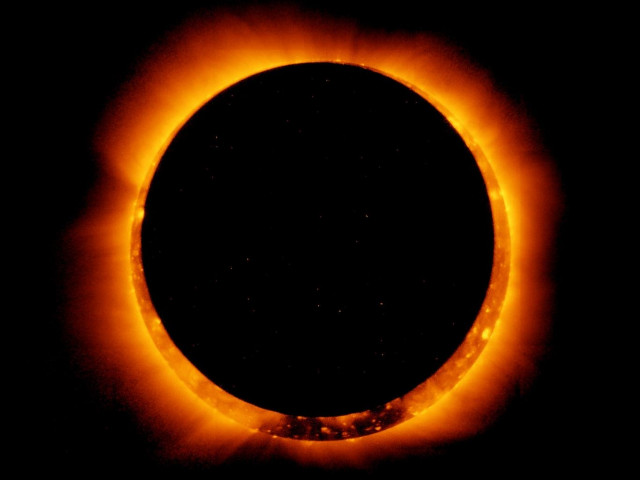Fear and excitement as Ring of Fire adorns skies over Pakistan
According to the Met department, the eclipse began at 8:46am and ended at 1:32pm

According to the Pakistan Meteorological Department (PMD), the partial eclipse began at 8:46am. However, the complete eclipse began by 9:48am.
At approximately 11:40am, the moon was said to have completely eclipsed the sun. As per the Met department, the eclipse ended at 1:32pm.
In a tweet from his personal account Federal Minister for Science and Technology Fawad Chaudhry said the country was to witness six eclipses this year - four lunar eclipse and two solar eclipse. However, the second solar eclipse, expected to occur on December 14 will not be visible in Pakistan, he added.
جب انسان کا علم بہت محدود تھا تو توہم پرستی بھی عروج پر تھی، ہر شے جو پسند آتی تھی اسے خوش قسمتی اور جس چیز سے خوف آتا تھا اسے عذاب سے جوڑ دیا جاتا تھا، گرہن بھی ایسا ہی عمل تھا، اب سائنس نے گرہن کی قلعی کھول دی ہے تو اس سے جڑی توہم پرستی کی کہانیاں بھی آخری سانسیں لے رہیں ہیں
— Ch Fawad Hussain (@fawadchaudhry) June 21, 2020
The minister also pointed at the age-old misapprehensions that surrounded events like the solar eclipse owing to humankind's limited knowledge. "Now that science has revealed the truth behind eclipses, all the myths related to it are at death's door," the minister observed.
The astronomical event was greeted with much excitement and nervousness as the solar eclipse hashtag trended in Pakistan. While some people shared hilarious memes, others wondered whether it was the end of the world.
Environmental lawyer Ahmad Rafay Alam tweeted pictures of shadows on a sidewalk which all looked like crescents!
All the shadows are crescents!! #SolarEclipse pic.twitter.com/LnrthOpt31
— Ahmad Rafay Alam (@rafay_alam) June 21, 2020
— Ahmad Rafay Alam (@rafay_alam) June 21, 2020
Visible in Pakistan
The eclipse was visible in different cities of Pakistan at slightly varied times. In Islamabad, the solar eclipse began at 9:50am, was at its peak at 11:26am and ended at 1:06pm.
Lahore witnessed the solar eclipse at 9:48am, saw its peak at 11:26am; it ended at 12:46pm, the Met department stated.
In Karachi, the solar eclipse began at 9:26am, rose at 10:59am and ended at 12:46pm.
Peshawar witnessed the start of the eclipse at 9:48am, saw its rise at 11:21am and ended at 1:02pm.
In Quetta, the eclipse began at 9:35am, peaked at 11:06am and ended at 12:49pm.
Some other cities that witnessed the eclipse were Gilgit, Muzaffarabad, Sukkur and Gwadar.
Solar eclipse
So-called annular eclipses occur when the Moon - passing between Earth and the Sun - is not quite close enough to our planet to completely obscure sunlight, leaving a thin ring of the solar disc visible.
They happen every year or two, and can only be seen from a narrow pathway across the planet.
Were the Moon just a wee bit closer – 379,100 rather than 381,500 kilometres away – Earthlings would be treated to a total blackout, visible at a given spot on our planet about every 400 years.
Remarkably, the eclipse this Sunday was on the northern hemisphere’s longest day of the year - the summer solstice - when Earth's north pole is tilted most directly towards the Sun.
"The annular eclipse is visible from about two percent of Earth surface," Florent Delefie, an astronomer and the Paris Observatory, told AFP.
"It's a bit like switching from a 500-watt to a 30-watt light bulb," he added. "It's a cold light, and you don't see as well."
Skywatchers along a narrow band from west Africa to the Arabian Peninsula, India and southern China get to witness a dramatic "ring of fire" solar eclipse:
— AFP News Agency (@AFP) June 21, 2020
Seen from: (clockwise) Nairobi, Kurukshetra, Bangalore, New Delhi
Read more: https://t.co/yxNXhgQRRa pic.twitter.com/UuC7kJJln0
"Good weather is the key to successful eclipse viewing," astrophysicist Fred Espenak, an expert on eclipse prediction, commented on the NASA Eclipse website. "Better to see a shorter eclipse from clear sky than a longer eclipse under clouds."
A solar eclipse always occurs about two weeks before or after a lunar eclipse, when the Moon moves into Earth's shadow. Lunar eclipses are visible from about half of Earth's surface.
There will be a second solar eclipse in 2020 on December 14 over South America. Because the Moon will be a bit closer to Earth, it will block on the Sun's light entirely.
Even if the day has darkened, looking at a solar eclipse with the naked eye is dangerous.
Sunglasses - which don't filter out UV rays - do not offer any protection, Delefie warned. "The Sun is so bright that even when there's only a tiny portion visible, it is still dangerous for the eyes," he said.
(With additional input from AFP.)


















COMMENTS
Comments are moderated and generally will be posted if they are on-topic and not abusive.
For more information, please see our Comments FAQ